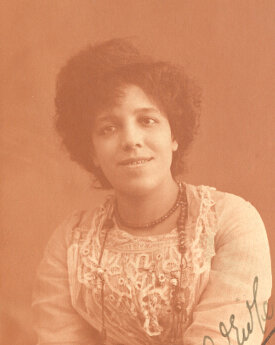On Parade: QUICK MARCH
by Amanda C. E. Aldridge ed. by Kaitlin Bove
On Parade
Amanda Aldridge ed. by Bove as recorded by the University of Hawaii Wind Ensemble and Dr. Jeffrey Boeckman
To obtain a copy of On Parade, please make a donation of $20 or more to And We Were Heard!
Amanda C. E. Aldridge
Grade 4 | 2:50 | © 1914/2020
About the Edition:
On Parade is an English “quick step” march featuring a typical first and second strain, trio, and an unusual secondary trio (a trio-within-a-trio!) that modulates the piece to a third tonal area. The 2020 edition resolves several practical and stylistic issues with the available 1914 Boosey & Hawkes score-less parts that can be found through the US Library of Congress or IMSLP. Instrument parts have been struck or added to modernize the instrumentation. Stylistically, the dynamic range has been expanded and several courtesy slurs and articulation markings have been added to facilitate cleanliness of lines and phrases. Rehearsal letters, measure numbers, and a tempo marking have been added for convenience and errata has been fixed.
About the Composer:
Amanda Christina Elizabeth Aldridge, also called Amanda Ira Aldridge, was born in London in 1866. She was the daughter of African American Shakespearian actor, Ira Aldridge, and Swedish opera singer, Amanda Pauline von Brandt; and sister to Luranah Aldridge, also an opera singer. In her youth, Aldridge was an accomplished pianist and singer (a student of Jenny Lind) and studied composition at the Royal College. In later years, she taught private voice and elocution lessons to British and American singers and actors, including Black performers Paul Robeson, Roland Hayes, and Marian Anderson.
Her compositional career spanned from approximately 1906 to 1934 and included instrumental music, seven piano suites, and at least twenty-six art and parlor songs. Embracing her African American heritage, several of Aldridge’s works incorporate African musical material or are settings of African American texts by poets such as Paul Laurence Dunbar. While much of her music was published under the male pseudonym, Montague Ring, her true identity was an open secret amongst her supporters, family, and music circles. Her most popular works include Three Arabian Dances (1919), Three African Dances (1913), and Carnival Suite of Five Dances (1924) with many works written or arranged for military and dance bands of the time.
Aldridge never married nor bore children but kept in close social contact with her students and cared for two birds, Mr. and Mrs. Browne, through her life. She died after a short illness in 1956.
- compiled from “Amanda Aldridge, Teacher and Composer: A Life in Music”
in Journal of Singing, Jan/Feb 2010 by Joyce Andrews

